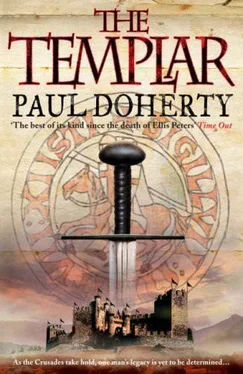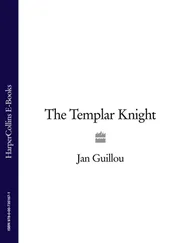P. Doherty - The Templar
Здесь есть возможность читать онлайн «P. Doherty - The Templar» весь текст электронной книги совершенно бесплатно (целиком полную версию без сокращений). В некоторых случаях можно слушать аудио, скачать через торрент в формате fb2 и присутствует краткое содержание. Год выпуска: 2010, ISBN: 2010, Издательство: Minotaur Books, Жанр: Исторические приключения, на английском языке. Описание произведения, (предисловие) а так же отзывы посетителей доступны на портале библиотеки ЛибКат.
- Название:The Templar
- Автор:
- Издательство:Minotaur Books
- Жанр:
- Год:2010
- ISBN:9780312576837
- Рейтинг книги:5 / 5. Голосов: 1
-
Избранное:Добавить в избранное
- Отзывы:
-
Ваша оценка:
- 100
- 1
- 2
- 3
- 4
- 5
The Templar: краткое содержание, описание и аннотация
Предлагаем к чтению аннотацию, описание, краткое содержание или предисловие (зависит от того, что написал сам автор книги «The Templar»). Если вы не нашли необходимую информацию о книге — напишите в комментариях, мы постараемся отыскать её.
The Templar — читать онлайн бесплатно полную книгу (весь текст) целиком
Ниже представлен текст книги, разбитый по страницам. Система сохранения места последней прочитанной страницы, позволяет с удобством читать онлайн бесплатно книгу «The Templar», без необходимости каждый раз заново искать на чём Вы остановились. Поставьте закладку, и сможете в любой момент перейти на страницу, на которой закончили чтение.
Интервал:
Закладка:
The same applied to Godefroi of St Omer, who came next. In contrast to Hugh, Godefroi was a rather stout, short young man with a smooth, smiling face beneath a mop of flaxen hair. His clear blue eyes gazed out on the world like those of a confused child. Godefroi of St Omer, the only beloved son of his parents, gave the impression that nothing in life was too serious. As he began to list his sins, Alberic realised that Godefroi, his manor lord with advowson to this church, was like a forest pool: a placid surface hiding a veritable tangle beneath. Despite his looks and easygoing ways, Godefroi had also taken part in the chevauchées into Iberia. Fired by the Chanson de Roland , the epic deeds of Charlemagne and his paladins, he had fought the infidels along the rocky gorges of the mountain passes. Nonetheless, he had become a deeply troubled man, a knight who now realised war was not glory. He talked of dark, despairing days, freezing cold in the mountains. How the rain and hail slashed down, smashing tents, spreading infection amongst the horses and rotting the already mouldering pork and the weevil-infested biscuits. How the rain had turned their shirts of mail to heavy rust. He also described massacres on dusty plains, wells and river beds being choked with corpses. Godefroi had returned from such wars wondering what all that had to do with the love of Christ. He asked the same question now and received the usual answer: God’s will! Urban had preached this and the Church upheld it. After all, hadn’t God in the Old Testament raised David the warrior to defend his people? Moreover, in the New Testament, Christ had told Peter to simply put up his sword, not throw it away. Father Alberic quietly congratulated himself on this clever piece of casuistry, taught to him by a canon lawyer from Avranches. He was about to administer absolution when Godefroi’s head came up, and he stared full and frank at the priest.
‘And there’s Anstritha, Father. She was involved in our secret quest. Her death troubles us.’
‘Our quest remains. They claim she was a witch.’
‘Who sought refuge in our church.’
‘I could not help her,’ Alberic hissed, ‘nor could any of you. The Lady Eleanor and the Lord Hugh were visiting Clermont. You were with them. It happened so swiftly, her blood does not stain our hands.’
Godefroi nodded, rose and walked away. Alberic put his face in his hands as if in prayer, a sign to the next penitent that he was not yet ready.
And to whom do I confess? the priest wondered. Memories swirled back like prophets of doom. Old enemies bearing old sins. The battle line at Senlac buckling. The mailed horsemen milling in, faces hidden behind conical helmets and broad nose-guards. The Fighting Man, the battle standard of Wessex, drooping like a wounded bird in the wind. The screams of blood-splattered men, his own heart giving way. The ring of faith around Harold Godwinson tearing and splintering like a tree struck by lightning; his own courage ebbing like wine from a cracked cup.
‘Coward!’
The word still lashed Alberic’s soul, as it did when he tramped the roads with Brother Norbert. Anstritha was simply a fresh cut to an old wound. A clever woman, skilled in simples and herbs, she was a woman of secrets who had followed the same path as Alberic, Norbert, Hugh and Godefroi, searching for the truth. Perhaps she could have been better protected? Yet she had certainly been marked down for death. Villagers, hooded and visored, taking advantage of their manor lord’s absence, had attacked her in her shabby house on the outskirts of the village. God knows the reason! A child had died. Food was scare. The signs had been seen. A victim was needed, and Anstritha became the scapegoat. She had fled to this church, begging for Alberic’s help. He was going to give it, God knows he was! He was terrified. Anstritha even might name him as an accomplice in her secret business. He had hurried back into the sacristy, but the corpse door had been forced and the mob surged in. Alberic had hid in the narrow, incense-filled enclosure whilst the mob had dragged Anstritha out and hanged her from a makeshift gallows above a fire. Eventually she had stopped screaming. The Lord Godefroi had returned the following week, but despite his anger and that of Lord Hugh, the culprits escaped unscathed.
A loud cough made Father Alberic take his hands away. Robert the Reeve, anger incarnate, was waiting, his choleric face twisted in impatience. The priest secretly wondered if Robert had had a hand in poor Anstritha’s death, yet he doubted the reeve would confess to that. After all, in the eyes of many villagers, Anstritha was a witch, deserving of death, a righteous act pleasing to God. Behind Robert waited the rest: Imogene, the pretty, dark-haired widow whom the Lady Eleanor had agreed to take with her on pilgrimage as a helpmate and companion; Fulcher the blacksmith; Peter Bartholomew, the young hunchback who saw visions in the dark, wet woods; and behind him a score of others, including Alberic’s close friend Norbert the Benedictine monk. Norbert, however, would not be kneeling at the mercy chair. He crouched at the foot of a pillar while the rest milled around. They were impatient for the priest to finish so they could feast on the bread, wine and tasty meats laid out on trestle tables, garlands of wild flowers woven around the jugs and flagons. Tonight they would celebrate, and within the week they would join Raymond of Toulouse, Count of St Gilles, in his march on Jerusalem. For now, however, the shriving continued, though the harsh whispers were drowned by the rising hum of conversation. Hungry eyes drifted to the heaped platters, and people wondered if their horses and pack ponies stabled in God’s Acre outside were safe. At last Father Alberic finished. He climbed into the crude wooden pulpit and they all gathered around.
‘The Lord is a man of war,’ Alberic intoned from the Book of Exodus, ‘and so must ye…’
Father Alberic’s tongue changed from the words and phrases of the langue d’oc , the speech of the south, to those of the langue d’oïl of the north, as he described the exploits of the great warriors of God in the Old Testament. Eleanor, leaning against a pillar, jumped as the priest’s talk was cut short by the church door slamming shut. She whirled round and stared at the man garbed in a black cotehardie that fell over leggings of the same colour, his stout ox-hide boots jingling with spurs. He wore a white tunic beneath the black, which peeped out between the creases of his robe. The sword belt slung over his shoulder carried a sheath, a knife and a short stabbing sword. Eleanor’s first impression was that the stranger was the devil come to dispute with them: that saturnine face under the close-cropped hair and those clever eyes, which, despite the poor light, reflected the mockery in his soul.
‘I am Beltran.’ He spoke the langue d’oc like a troubadour. He glanced impishly at Eleanor. ‘I am a poet, a soldier, but above all, the emissary of His Excellency Raymond, Count of Toulouse, fidelis miles Christi et Papae , faithful soldier of both the Lord Christ and the Pope.’ He brandished a small scroll tied with a red ribbon. ‘I am here at Count Raymond’s behest to lead you.’
‘We have a leader.’ Eleanor pointed to her brother.
‘Then I will be his adviser.’ Beltran’s face broke into a smile. ‘I also bring you a copy of the Count’s personal banner.’
‘We have taken an oath to God,’ Godefroi declared hotly. ‘We hold nothing in fief or knight service to any lord.’
‘No, no,’ Beltran replied merrily. ‘The Count offers you protection under his banner.’ He undid his jerkin and brought out the blue and gold pennant of the Lords of St Gilles. ‘I must also check your supplies and stores. So,’ he held up his hand, ‘by what name shall ye be called?’
Читать дальшеИнтервал:
Закладка:
Похожие книги на «The Templar»
Представляем Вашему вниманию похожие книги на «The Templar» списком для выбора. Мы отобрали схожую по названию и смыслу литературу в надежде предоставить читателям больше вариантов отыскать новые, интересные, ещё непрочитанные произведения.
Обсуждение, отзывы о книге «The Templar» и просто собственные мнения читателей. Оставьте ваши комментарии, напишите, что Вы думаете о произведении, его смысле или главных героях. Укажите что конкретно понравилось, а что нет, и почему Вы так считаете.












